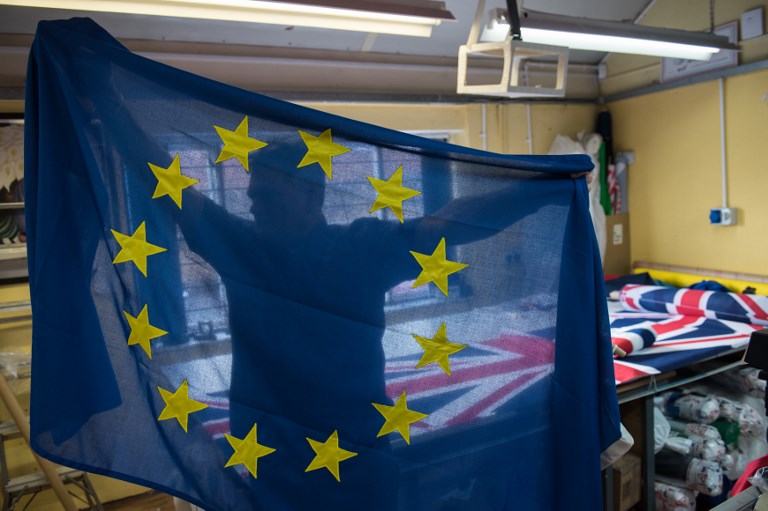Delay or no-deal? Brexit heads to cliffhanger finale

Andy Ormrod, the owner of Flying Colours Flagmakers Ltd, inspects a newly produced European Union (EU) flag in their premises in Knaresborough, northern England on February 7, 2019. AFP
LONDON, United Kingdom – Brexit is racing toward a cliffhanger finale that could still see Britain crash out of the European Union in nine days without a plan for unwinding 46 years of intricate ties.
The political sands keep shifting and various talks are underway that could still alter Brexit’s shape.
But here is a look at the most likely scenarios heading into the March 29 Brexit deadline.
Short deadline delay
Britain on Wednesday formally requested a Brexit deadline extension until June 30.
The European Commission has advised that a shorter delay until May 23 — before EU member states hold European Parliament elections — or a much longer one until at least the end of 2019 would be better.
EU president Donald Tusk has, in any case, made the short Brexit deferral “conditional on a positive vote on the withdrawal agreement in the House of Commons”.
This vote would most likely happen just a handful of days before the deadline — with the fate of both Brexit and May’s government at stake.
Longer Brexit delay
Prime Minister Theresa May explicitly ruled out a longer extension both in her letter and appearance in parliament.
A delay of up to two years has been championed by proponents of Europe who want May’s strategy to be completely revised — or for Brexit to be reversed in a new national referendum.
“As prime minister, I am not prepared to delay Brexit any further than June 30,” May said.
May’s comments sparked immediate speculation that she was ready to resign if her deal was not voted through next week.
This makes the path to a long postponement more complicated.
It would require parliament to reject May’s deal for a third time.
The UK government must then decide that it cannot go through with the option of simply crashing out of the bloc next week.
The other 27 EU leaders then have to unanimously accept the even longer delay.
May’s government would be perilously weakened were she to try to stay on as government leader after seemingly going back on her word.
Second referendum
Lawmakers last week voted massively against delaying Brexit in order to hold a second referendum.
It was a blow to “People’s Vote” campaigners who see it as their best way to keep Britain in the EU.
The pressure for another vote would, however, grow were Brexit delayed beyond June 30.
The main opposition Labor party still views another referendum as an option.
No deal
The House of Commons last week voted through an amendment saying it cannot accept a scenario under which Britain leaves without a deal.
But this remains the default option — and one whose prospects rose considerably on Wednesday.
Tusk implied that EU leaders were prepared to part with Britain without an agreement were one not voted through in London next week.
Any deadline deferral that comes without parliament’s initial backing for May’s pact leaves open the possibility of a no-deal Brexit down the line.
Britain would then revert to trade rules established by the World Trade Organization (WTO).
Some fervent Brexit supporters see this as a viable economic model.
Businesses worry that the global body is too unwieldy to quickly resolve the litany of trade disputes that will inevitably spring up.
General election
May’s potential resignation would force her Conservative party to choose a new leader but not necessarily result in a general election.
The House of Commons could force one by voting no-confidence in May’s government. A new election would then be held if no one can form a new cabinet within two weeks.
The premier also has the option of calling early elections. That motion would also require parliamentary support. /cbb














